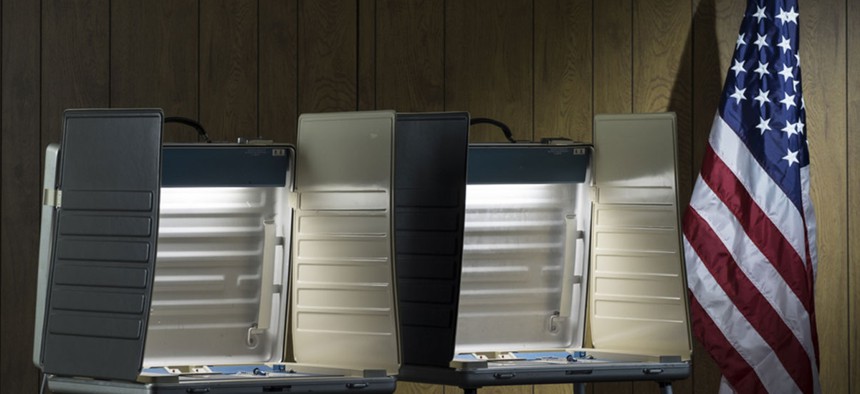
Burlingham/Shutterstock.com
How to Cure Your Post-Election Stress
Once you've cast your vote, you've done all you can.
The 2016 US presidential election has dragged on for an almost sickeningly long time. The toxicity between Hillary Clinton and Donald Trump has gotten to the point where no one wants to know anything more about either of them.
So now that we’re mere hours (hopefully) from counting the final votes to decide the next leader of the free world, political tensions are running at their highest. “In my 28 years of practice, I’ve never seen anything like this,” says Nancy Molitor, a clinical psychologist practicing outside of Chicago, “It’s not just the divisiveness, it’s the prolonged stress.”
The final, undecided moments are enough to make anyone a little crazy—especially after you’ve done all you can by casting your own vote. Here’s how to stay calm during the uncertainty, or at least not let your post-election stress get the best of you.
Acknowledge your anxiety
The two main candidates are polarizing, not just in terms of policy, but also personality. Aside from the 6% to 10% of voters who are undecided, most of us feel unwaveringly passionate about our candidate, and fear the other would be a catastrophic mistake.
Since we each get only one vote and are bombarded with polls that show the candidates are neck and neck (especially in the popular vote), it’s natural to feel anxious. “It’s uncertainty and a lack of control: Those are the two things that are a recipe for anxiety for anybody,” Molitor says.
Voting relieves some stress because it represents one way you can exert control over the outcome of the election. Beyond casting your own vote, you can help others place their ballots by doing things like bringing the elderly to vote or volunteering at polls.
But you’re still probably not going to feel completely calm until the results come in—and that may make for a long night.
Know when you need to tap out
Voting counts and poll numbers will be flooding in all day, and could make for an emotional roller coaster. Although everyone should monitor results as they normally would, even the most politically-minded of us are going to need breaks from the relentless 24-hour news cycle on television and the internet. “Stay engaged at a level that is reasonable for you,” Molitor says.
But reasonable also means reasonably unplugging from election coverage. Take some time to focus on tasks you need to get done (after all, Nov. 8 is still just another day). Immersing yourself in unrelated work or personal projects may help you feel productive and give you a little bit of a sense of control, and it can help pass some of the time.
Don’t try to convince anyone to vote for your candidate of choice
Election Day is not the day to try to engage someone who disagrees with you. Joining in any more arguments about the candidates—whether on the internet or IRL—is just going to agitate you even more, without actually changing the outcome. Once people have cast their votes, there’s nothing more to be done; it’s best to just move on (at least for today).
Plus, Molitor says, it’s likely that some of the people closest to you disagree with you politically. Regardless of who wins the election, we all still have to face each other Nov. 9; it’s not worth it to be disrespectful or mean in the moment and damage relationships we have to maintain for the long-haul.
Be wary of social media use; don’t let yourself get fired up online, and don’t post anything to ignite a debate, either. If anyone tries to engage you in a combative political conversation in real life, Molitor recommends simply saying that you’ve voted, and then diverting the topic.
Surround yourself with like-minded friends
Conversely, the whole thing will probably feel a lot better if you spend the day with “friends that you trust and think the same way you do,” Molitor says.
That can validate your concerns, and also hopefully take your mind off the race when you talk about other shared interests and humor. As the Anxiety and Depression Association of America points out, “A good laugh goes a long way.”
Make sure to try to lighten the mood, when possible, and remember that although the election is serious, it’s not the end of the world. Even if your candidate of choice loses, there are checks and balances in the US government, like Congress and the Supreme Court, to temper any extreme actions by the executive branch.
Take care of yourself
When stress takes over your mind, it’s important to take care of your body. Eat well, get enough rest, and exercise. Your physical health is one more thing you can control during the day, and exercise and sleep in particular can alleviate anxiety.
Feel free to unwind with a glass or two of wine, Molitor says, but don’t overindulge. “Alcohol is a central nervous system depressant,” Molitor says, “It can end up making you literally depressed.” If you start drinking because your candidate is losing, it may exacerbate your feelings of hopelessness. And you might end up hungover the next day, which won’t exactly help in relieving post-election anxiety.
“This is a marathon, not a sprint,” she says. Fortunately, she added, “like a marathon, it’ll have an end.” Soon, the cycle will be over—and we won’t have to think about electing another American president for four years.






